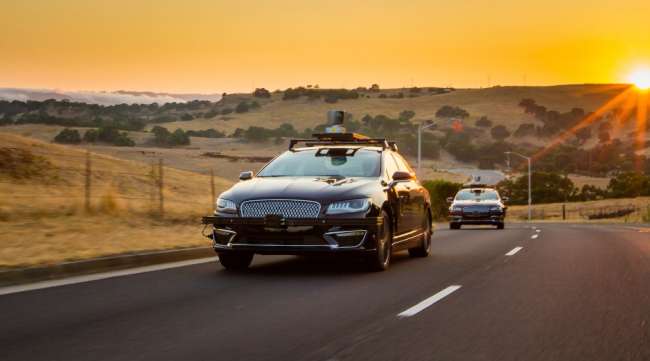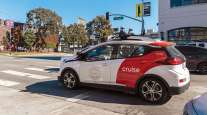Self-Driving Car Firm Aurora to Expand After Deal With VW, Hyundai

Deals inked by the self-driving car firm Aurora with two major auto manufacturers will mean more jobs and more test vehicles on the streets in Pittsburgh, one of the company’s co-founders told the Tribune-Review.
Aurora on Jan. 4 announced partnerships with Volkswagen Group and Hyundai to develop autonomous vehicles for the companies.
The deals are the first for Aurora, a company led by veteran self-driving engineers with offices in Pittsburgh and California.
RELATED: Passenger cars could point path to automated steering in trucks
RELATED: Self-driving cars hit Las Vegas streets for tech tradeshow
Sterling Anderson, Aurora’s chief product officer, said it takes an army of highly skilled people to tackle autonomous vehicles, and he expects that army to grow in 2018.
“With partnerships of this magnitude, quite a lot of expansion will happen,” Anderson told the Tribune-Review.
Aurora was founded by Anderson, the former head of Tesla’s Autopilot program; Chris Urmson, who helped start Google’s self-driving car program, and Drew Bagnell, who led autonomy and perception at Uber’s Advanced Technology Group in Pittsburgh. Urmson and Bagnell have strong ties to Carnegie Mellon University and Pittsburgh robotics companies.
The company has offices in Pittsburgh, San Francisco and Palo Alto, Calif. Anderson said Aurora wanted to have a presence in Pittsburgh to benefit from the immense talent in the city. That decision has paid off, Anderson said.
“Our Pittsburgh team is world class,” Anderson said, adding that the engineers in the city bring a depth of experience that has been a real boon to Aurora.
Aurora started testing a fleet of autonomous vehicles last year in Pittsburgh. Anderson expected that fleet to grow and to eventually include vehicles under development for VW and Hyundai. The company is also testing cars in California. The two locations give Aurora a nice diversity of urban, suburban and highway driving as well as different terrain and weather, Anderson said.
“At one point we had to put the vehicles in a garage that was a little warmer when it got well below freezing,” Anderson said of the recent Pittsburgh weather.
Anderson would not say if or how much VW or Hyundai invested in Aurora, calling the deals significant, in the long term.
Past deals between legacy auto makers and self-driving startups have been worth hundreds of millions, even billions of dollars. Ford invested $1 billion in Argo AI. Delphi bought nuTonomy for $400 million. General Motors bought Cruise Automation in a deal said to be worth more than $1 billion. Uber’s most recent deal with Volvo would account for 4.5% of the Swedish auto maker’s total sales and also be worth more than $1 billion.
Anderson’s efforts with both VW and Hyundai will start focused on ride-sharing, ride-hailing, shuttles and other mobility-as-a-service applications. He expected both companies to eventually integrate Aurora autonomous technology into different brands and vehicle models.
The companies give Aurora access to different vehicles, from traditional cars, trucks and SUVs to commercial vans and shuttles. Aurora is working on self-driving technology that can work with all of them.
“We’re doing what we can to develop the driver, to a degree possible like you and I, that is able to operate different platforms with only minor adjustments,” Anderson said.
Anderson was not worried about competing self-driving companies, saying Aurora is “very happy with where we are.”
“This is something that Drew, Chris and I have been focused on for well over a decade,” Anderson said. “Long before it was trendy.”
Distributed by Tribune Content Agency, LLC




